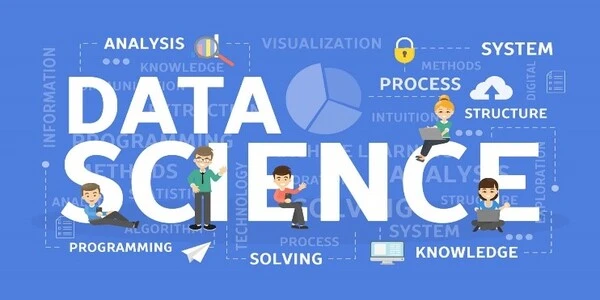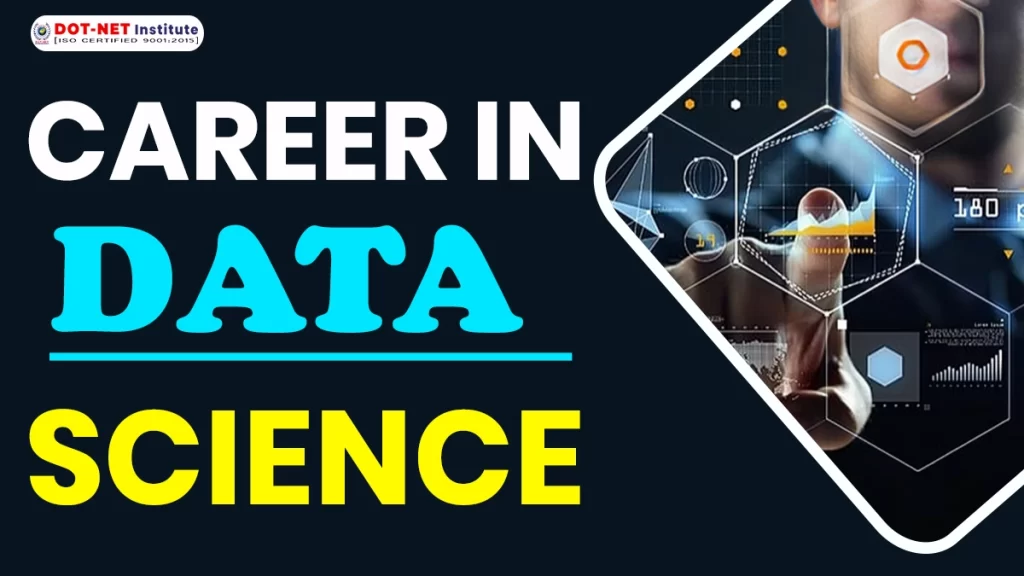A career in data science is an exciting prospect, but it requires a well-rounded skillset. You’ll need strong technical skills in analysis, machine learning, statistics, and tools like Hadoop. Additionally, soft skills like critical thinking, communication, listening, and problem-solving are essential for success. Data science training is crucial, and there are many resources available to help you get started. With the right qualifications, you’ll be well-positioned to enter this in-demand field with plenty of opportunities. So, let’s discuss about it detail!!
Contents
What is data science?

Data science is a field akin to detective work, where the “clues” are vast amounts of data. By collecting and analyzing this data, data scientists can extract valuable insights and knowledge. These insights can then be used to make informed decisions or even predictions, in areas ranging from product recommendations to medical research. The ultimate goal of data science is to leverage the power of data to make better choices, and its growing importance is evident across diverse industries.
Also read: 10 ऐसी jobs future के लिए जिसका AI कुछ नही बिगाड़ सकती
Types of career in Data science
The world of data science offers a diverse range of exciting career paths. Here are some of the most common job:
- Business Intelligence Analyst: These analysts use data to uncover market and business trends, helping companies understand their current position and make informed decisions.
- Data Mining Engineer: Going beyond company data, data mining engineers analyze information from external sources as well. They create sophisticated algorithms to delve deeper into the data and extract valuable insights.
- Data Architect: Data architects collaborate with various teams to design blueprints for data management systems. These systems centralize, integrate, maintain, and protect crucial data sources.
- Data Scientist: Data scientists translate business needs into actionable plans. They develop hypotheses, analyze data, and explore patterns to understand their impact on the business. They also select and apply algorithms to further analyze the data. Their role goes beyond explaining the future effects of data; they also devise solutions to help companies navigate those effects.
- Senior Data Scientist: Combining data gathering with in-depth analysis, senior data scientists tackle complex business problems with efficiency. Their experience allows them to not only design new data standards but also drive their development. They create methods for utilizing statistical data and develop tools for further analysis.
Build your career in Data science
Fueled by the explosion of Big Data and its potential for valuable insights, data scientist roles have become highly sought after, consistently ranking among the top jobs in recent years. Though no longer the absolute top contender, the demand for data scientists remains strong and widespread, with companies like Oracle, Apple, and Microsoft actively seeking their expertise. Businesses across all sectors leverage data-driven insights from data scientists to gain a competitive edge and optimize costs. As long as data remains the cornerstone of informed decision-making and strategic planning, the need for data scientists will continue to thrive.
Salary of a Data scientist

A career in data science offers promising prospects for individuals with the necessary qualifications. The demand for data scientists is expected to continue rising, leading to increased salaries for those already in the field. Indeed reports that Data Scientists in the United States can earn a yearly average of USD 113k while Payscale shows Data Scientists in India earning an annual average of ₹824k
Qualification
While a rewarding career path, becoming a data scientist requires dedication and perseverance. Earning an advanced degree is often a prerequisite, with an estimated 40% of positions requiring this level of education. Fortunately, online resources and educational providers can ease the learning curve. Platforms like Simplilearn offer data science courses tailored to equip you with the most sought-after skills and technologies in the field, including Python, machine learning, and data visualization tools like Tableau. These courses provide a structured and efficient alternative to self-study, ensuring you gain the in-depth knowledge and expertise needed to thrive in this demanding yet fulfilling field.
Also read: The Impact of Artificial Intelligence (AI) on the future work
Job Responsibilities of Data scientist
- Unveiling hidden insights: They delve into datasets, searching for patterns and trends that can shed light on business problems or opportunities.
- Building predictive models: By creating algorithms and data models, they forecast future outcomes, enabling informed decision-making.
- Enhancing data and products: They utilize machine learning techniques to refine the quality of data or product offerings, ensuring accuracy and efficacy.
- Communicating findings: They effectively convey their recommendations to diverse teams and senior staff, fostering collaboration and knowledge sharing.
- Utilizing data analysis tools: They leverage their expertise in programming languages like Python, R, SAS, and SQL to analyze data efficiently.
- Staying current: They continuously learn and adapt by keeping pace with the latest advancements in the ever-evolving field of data science.
Skills need for career in Data science

Technical Skills:
- Programming: Languages like Python and R are crucial for data manipulation, analysis, and model building.
- Statistics and Probability: Understanding statistical concepts and probability theory is essential for interpreting data and creating robust models.
- Data Wrangling and Database Management: Extracting, cleaning, and organizing data from various sources is a core skill.
- Machine Learning and Deep Learning: Expertise in these areas allows data scientists to design and implement algorithms that learn from data.
- Data Visualization: Effectively communicating insights through clear and compelling visualizations is vital.
- Cloud Computing: Familiarity with cloud platforms like AWS or Azure is increasingly important for managing and processing large datasets.
Soft Skills:
- Communication: Data scientists need to explain complex findings to both technical and non-technical audiences.
- Collaboration: Working effectively with colleagues from various backgrounds is essential in real-world projects.
- Critical Thinking and Problem-Solving: The ability to analyze problems, identify patterns, and develop solutions is key.
- Curiosity and Continuous Learning: The data science field is constantly evolving, so staying up-to-date is crucial.
Also check:
-
5 Best Computer Course in India for Private Job (India में प्राइवेट नौकरी के लिए 05 BEST कंप्यूटर कोर्स)
-
Google jobs in India | Google में चाहिए नौकरी तो कर ये 5 कोर्स - मिलेगा लाखों का पैकेज | Google Jobs
-
Retail Management Career | Retail Jobs | How to get Retail Management Job
-
How to Start Earning as a Graphic Designer?
-
Paramedical Courses | Paramedical Career | कम बजटऔर कम फीस में मेडिकल करियर बनेगा
Conclusion
A career in data science offers a unique blend of intellectual challenge, impactful problem-solving, and constant learning. Whether you’re drawn to the potential to unlock hidden insights or the opportunity to shape the future with data-driven solutions, this field holds immense promise. So, if you’re ready to embark on a journey of discovery and make a real difference in the world, consider taking the first step towards a fulfilling career in data science.
Also check:
FAQs
Data science is the field of extracting knowledge and insights from data using various techniques like statistics, machine learning, and data visualization. It involves collecting, cleaning, analyzing, and interpreting data to solve real-world problems.
Data science is a rapidly growing field with high demand and good job prospects. It offers competitive salaries, diverse work opportunities across industries, and the potential to make a real impact. However, it requires strong technical skills and continuous learning.
Technical skills like programming (Python, R), statistics, machine learning, and data visualization are essential. Additionally, communication, problem-solving, critical thinking, and teamwork are crucial for success.
While a bachelor’s degree in computer science, statistics, mathematics, or related fields is common, there are alternative paths like bootcamps, online courses, and self-learning. The focus should be on acquiring the necessary skills and building a strong portfolio showcasing your abilities.
Start by exploring the field through online resources, courses, and personal projects. Develop your core skills, participate in data science competitions, and build a portfolio. Network with professionals, reach out for informational interviews, and consider applying for entry-level data analyst or data scientist positions.


